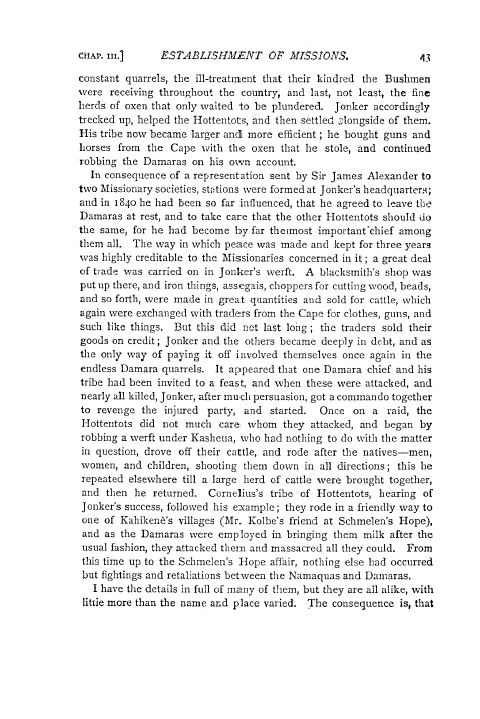cttnp. 111.3 ESTABLISHMENT Or MISSIONS.
43
constant quarrels, the ill-treatment that their kindred the Bushmen were receiving throughout the country, and last, not least, the fine herds of oxen that only waited to be plundered. Jonker accordingly trecked up, helped the Hottentots, and then settled alongside of them. His tribe now became larger and more efficient ; he bought guns and horses from the Cape with the oxen that he stole, and continued robbing the Damaras on his own account.
In consequence of a representation sent by Sir James Alexander to two Missionary societies, stations were formed at Jonker's headquarters; and in 1840 he had been so far influenced, that he agreed to leave the Damaras at rest, and to take care that the other Hottentots should do the same, for he had become by far theimost important'chief among them all. The way in which peace was made and kept for three years was highly creditable to the Missionaries concerned in it ; a great deal of trade was carried on in Jonker's werft. A blacksmith's shop was put up there, and iron things, assegais, choppers for cutting wood, beads, and so forth, were made in great quantities and sold for cattle, which again were exchanged with traders from the Cape for clothes, guns, and such like things. But this did not last long ; the traders sold their goods on credit ; Jonker and the others became deeply in debt, and as the only way of paying it off involved themselves once again in the endless Damara quarrels. It appeared that one Damara chief and his tribe had been invited to a feast, and when these were attacked, and nearly all killed, Jonker, after much persuasion, got a commando together to revenge the injured party, and started. Once on a raid, the Hottentots did not much care whom they attacked, and began by robbing a werft under Kasheua, who had nothing to do with the matter in question, drove off their cattle, and rode after the natives-men, women, and children, shooting them down in all directions ; this he repeated elsewhere till a large herd of cattle were brought together, and then he returned. Cornelius's tribe of Hottentots, hearing of Jonker's success, followed his example; they rode in a friendly way to one of Kahikene''s villages (Mr. Kolbe's friend at Schmelen's Hope), and as the Damaras were employed in bringing them milk after the usual fashion, they attacked them and massacred all they could. From this time up to the Schmelen's Hope affair, nothing else had occurred but fightings and retaliations between the Namaquas and Damaras.
I have the details in full of many of them, but they are all alike, with little more than the name and place varied. The consequence is, that

